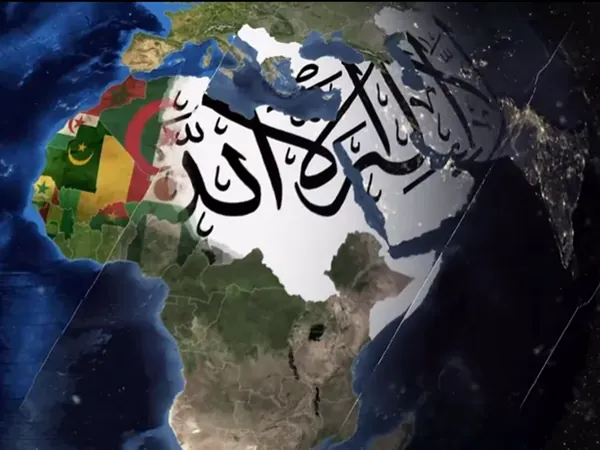
Controversial Islamic Conference in Ontario Sparks Outcry Amid Jihadist Manifesto Revelations
2025-01-08
Author: Michael
Controversy Surrounding Islamic Conference in Ontario
A recently announced Islamic conference in Ontario has become a focal point for controversy, following the release of a manifesto by Hizb ut-Tahrir that advocates for a radical interpretation of Islamic governance and calls for violent jihad. The group's doctrine has raised alarm among officials and organizations committed to countering extremism.
Hizb ut-Tahrir's Manifesto
Hizb ut-Tahrir, a global Islamic political organization, insists that it promotes change through intellectual and political dialogue rather than violence. However, their manifesto reveals a starkly different reality, espousing a totalitarian vision where Islamic law supersedes all other legal systems, and the existence of Israel is deemed unacceptable. The manifesto states, “Islam encapsulates the world” and promotes a worldview where jihad—defined as a means to impose Islamic authority—is a fundamental duty for Muslims.
Rescheduling of the Khilafah Conference
Originally set for January 18 in Mississauga, the Khilafah Conference, aimed at promoting the establishment of a caliphate governed by Sharia law, has since been relocated to an undisclosed venue in Hamilton due to significant backlash from concerned community leaders. Mississauga's mayor, Carolyn Parrish, expressed relief at the event's rescheduling, labeling Hizb ut-Tahrir as an "extreme group." Meanwhile, Hamilton mayor Andrea Horwath voiced serious concerns and has engaged local police to assess security implications.
Police and Community Response
The Hamilton police have acknowledged the situation and are coordinating with intelligence partners to monitor potential threats associated with the conference. “Hate has no place in our community,” said police spokesman Constable Adam Kimber.
Calls for Action from Advocacy Groups
Jewish advocacy groups, including the Friends of Simon Wiesenthal Center and B’nai Brith Canada, have called on the Canadian government to classify Hizb ut-Tahrir as a terrorist organization, citing their inflammatory rhetoric and aspirations for a caliphate that undermines democratic values. These organizations emphasize the need to prevent any platform for radicalization that could threaten societal peace and harmony in Canada.
Contradictions in Hizb ut-Tahrir's Messaging
Despite their denials of violent extremism, Hizb ut-Tahrir's teachings starkly contradict their public statements. The manifesto, originally issued in Arabic and later translated, lays out a vision for a single Islamic state that obliterates national borders, calling for the overthrow of Muslim governments deemed corrupt. The document suggests that true governance can only be restored through force if necessary, stating that jihad is a communal obligation that becomes an individual duty when Muslims are attacked.
Ideological Implications and Societal Impact
The ideological tenets of Hizb ut-Tahrir extend beyond mere governance; they reflect a commitment to an aggressive stance against perceived enemies, particularly Western nations and Israel. The manifesto outlines a black-and-white worldview, categorizing countries into those that are Islamic and those that are not, while calling for unwavering hostility against what they term “colonial/imperialist nations.”
Challenges for Canadian Society
This radicalism raises substantial questions about the group's compatibility with the values of a pluralistic society like Canada. The conference and its ideological underpinnings signify a challenging moment for Canadian society, as it navigates the complexities of free speech, ideological extremism, and public safety. As local authorities strive to maintain peace, the spotlight is on how communities will respond to potential threats posed by groups promoting divisive and militant ideologies.
Looking Ahead
With escalating scrutiny, the upcoming conference serves as a pivotal test for Canadian society's commitment to confronting radical ideologies while upholding the principles of freedom of expression and tolerance. Will the public stand united against radicalism in defense of democratic values, or will Hizb ut-Tahrir find a platform to propagate its divisive agenda? Stay tuned as developments unfold in this significant and contentious issue.



 Brasil (PT)
Brasil (PT)
 Canada (EN)
Canada (EN)
 Chile (ES)
Chile (ES)
 Česko (CS)
Česko (CS)
 대한민국 (KO)
대한민국 (KO)
 España (ES)
España (ES)
 France (FR)
France (FR)
 Hong Kong (EN)
Hong Kong (EN)
 Italia (IT)
Italia (IT)
 日本 (JA)
日本 (JA)
 Magyarország (HU)
Magyarország (HU)
 Norge (NO)
Norge (NO)
 Polska (PL)
Polska (PL)
 Schweiz (DE)
Schweiz (DE)
 Singapore (EN)
Singapore (EN)
 Sverige (SV)
Sverige (SV)
 Suomi (FI)
Suomi (FI)
 Türkiye (TR)
Türkiye (TR)
 الإمارات العربية المتحدة (AR)
الإمارات العربية المتحدة (AR)